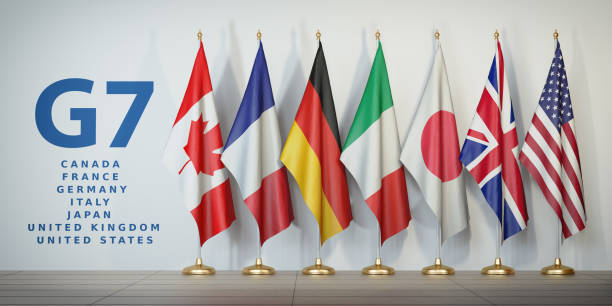As I followed the proceedings of the 47th G7 summit that held here in England two weekends ago, I kept asking myself: where the hell is Africa? Where the world’s second-largest and second-most populous continent is leading is in every single thing that is negative; in anything positive, it falls behind. As an African away from my continent, desperate for it to take the leading role in the world that is its right, this is a constant source of discomfort.
Britain’s Boris Johnson played host to his American, French, German, Canadian, Italian and Japanese counterparts to converse about the group’s top three shared challenges, if not threats: the triple ‘C’ of COVID-19, climate change and China. Africa was a big – if not the biggest – part of each of this agenda, but it wasn’t at the table. It was therefore, by definition, on the menu. South Africa was among the four other countries invited to this year’s episode, but even they were emphatically a guest.
For COVID-19, the goal was for G7 countries to “vaccinate the world”, a phrase that had in the weeks leading up to the event become a mantra for Boris Johnson. Knowing that no one is safe from this terrible virus until everyone is safe, Western leaders are worried that many countries are unable to help themselves. Left alone, the virus will keep spreading and mutating among some populations, risking the developed economies’ fragile, tentative grip on the situation. So it is not just a moral imperative, but also in the West’s self-interest to help these defenceless states to get safe. All of the 54 African countries fall in the unfortunate category.
It is shameful too that none of the 18 different vaccines in use across the world today came from Africa. Nor has Africa developed any in advanced trials. To make matters worse, unlike oil-rich Gulf countries like Saudi Arabia, Qatar and the UAE, who didn’t produce their own jabs either, African nations are unable to procure enough jabs for our people. Even if we could, there are questions of whether we have the storage, distribution and health infrastructure and the capacity needed to successfully put the vaccines to use. Little wonder then that we have so far been able to inject less than 2 per cent of our population when many countries are above 70 per cent. Africa may have so far been saved much of the human cost of this global pandemic, but economic recovery is impossible without large-scale immunization.
In case you think COVID-19 doesn’t matter because it has never been very bad in Africa (although look at South Africa), how about the second item on the G7 agenda: climate change? For several socio-economic and geological reasons, ours is the continent most vulnerable to the devastating impacts of global warming. Experts warn that the two most extensive, end-of-century, land-based decreases in rainfall will be in north and southern Africa, by which time agricultural yields will have fallen by 20 per cent per decade in some areas of the Sahel. Prolonged droughts, floods and landslides caused by climate change will progressively deplete land and water resources, destroy scarce essential infrastructure and drive mass migration. This will intensify our food crisis, increase abject poverty and unemployment and fuel insecurity.
This is not scaremongering about the distant future. Global warming is already affecting real lives and livelihoods in several parts of Africa. Protracted droughts in 2014– 2016 led to acute food shortages in many parts of southern Africa and experts warn that life in that part of the continent is soon going to become untenable if the current rise in temperatures continues. In the Horn, a sudden dramatic shift in conditions in 2018 – 2019 from extremely dry weather to floods and landslides associated with heavy rainfall destroyed homes, farms and businesses, living millions in dire need of assistance. Around the Sahel, numerous river floods were recorded in 2019, destroying livestock and agricultural land. This is not a problem of the future; it needs action now.
The G7 countries alone contribute a whopping 20 per cent of global warming while Africa’s 54 countries contribute less than 2 per cent. Averting the apocalypse of this phenomenon is for these culprits, as well as other major polluters like China and Russia, to take responsibility and cut their emission. Instead, they keep lecturing us about the problem and pay lip service to helping us cut our part – which is essentially nothing. That is exactly what happened again at the G7 summit. Participants pledged to raise $100 billion a year to help developing countries cut emissions and move away from coal power. They also said they will reduce theirs. But how are they going to do that? As always, the devil is in the detail, and detail was lacking. Where are the leaders of the most vulnerable continent to look them in the eye and tell them the truth?
The third item was China, but it was equally very much about Africa. Beijing’s growing economic and diplomatic influence in Africa has become a real source of worry for United States and Europe. In pursuance of its “Going out policy” launched in 2001, the communist country has emerged as an important economic, political and security actor in Africa. Its massive roll-out of the Belt and Road Initiative (BRI) – a trillion-dollar plan, signed by 39 African countries, to link infrastructure and trade via a vast new network of roads, rail lines, ports, and pipelines across the continent – has made Beijing the biggest player in Africa’s continent’s telecommunications industry and infrastructure, with trade between China and Africa rising from $765 million to more than $170 billion in the last four decades.
On the diplomatic-cum-cultural front, the number of Chinese-government-sponsored Confucius Institutes, which promote Chinese language and culture in Africa, has gone from zero in 2004 to 48 in 2018, in 20 different African countries. This will in the coming decades put pressure on the West’s strategic weight and its values. To prevent this, G7 members committed to investing billions into Africa’s physical and digital infrastructure. Germany’s Angela Markel tried to portray this as an effort to complement, rather than to counter, China, possibly to defend her country’s entanglement with Beijing; but the United States and other members couldn’t have been clearer that this is about offsetting Beijing’s influence across Africa.
Africa was front and centre in this year’s G7 summit, as it is in other global conversations. But, as always, we are treated as an object of pity and geopolitical games. We are hardly on the table in any serious way. But there is a wider problem. Even when we get a seat, our leaders have consistently failed to rise to the occasion. Instead, they have reduced themselves into beggars, rather than co-equals at the international scene. It is their corruption, selfishness and lack of foresight that have brought us to this unfortunate state. Until we get our act together by providing the leadership Africa craves for, we will continue to be exploited by all kinds of interests and groups to our detriment. Nigeria is the natural leader of Africa in this endeavour, but if it continues to fall short, I pray that may another country step in soon.

 Join Daily Trust WhatsApp Community For Quick Access To News and Happenings Around You.
Join Daily Trust WhatsApp Community For Quick Access To News and Happenings Around You.


